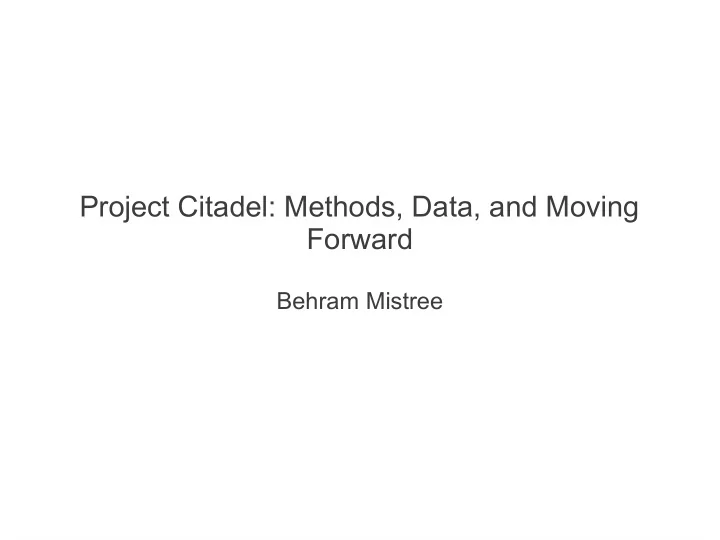

Project Citadel: Methods, Data, and Moving Forward Behram Mistree
Project Citadel: Goal Goal: to discover patterns in code and coding behavior that motivate features in a new virtual world scripting language
Outline ● Citadel Methods ● Preliminary Data ● Moving Forward ● Lessons Learning
Methodology: Keylogger ● Cross-platform addons to Emacs (E-Lisp) and Eclipse (Java) ● Logs: 1.Any change to a document 2.(Most) Causes of changes (paste/yank, undo, keypress, auto-complete (eclipse), etc.) 3.When change occurred
Methodology: Subjects ● Logging running on multiple subjects
Methodology: Subjects ● Logging running on multiple subjects
Ewen's Data ● Spans 1.5 Weeks: ● 451 files opened/modified ● .html, .h, .hpp, .txt, .cpp, .py, .sh, .tex, etc.
File Focus ● /home/ewencp/libprox.git/proxsim/src/Simulator.cpp 19,736 opens/modifies ● /home/ewencp/sirikata.sirikata/space/src/Proximity.cpp 17,739 opens/modifies
Methodology: Function Finding ● To get beginning of function, lex for function definition* ● Count number of open and closed braces until all braces match or see beginning of new function.
Methodology: Function Finding (ctd) ● Works for a subset of languages (curly brace dependent). ● Currently only works for class definitions ● Includes commented/stringed code ● Ignores macros ● May have a function definition inside a string ● Unterminated/incorrectly terminated functions incorrectly padded ● Loses if changes happen to function signature
Function Finding: How Well Did it Do? "void Proximity::handleCheckObjectClass(constUUID) {" "void Proximity::handleCheckObjectClass(con) {" "void Proximity::proxSubstreamCallback(int x, ProxStreamPtr streaProxStreamPtr substream, ProxStreamInfo* prox_stream_info) {" "void Proximity::tickQueryHandler(ProxQueryHandler* qh[NUM_OBJECT_CLASSES) {" "void Proximity::proxSubstreamCallback(int x, ProxStreamPtr stream, ProxStreamPtr substream, ProxStreamInfo* prox_stream_info) {" "void Proximity::handleCheckObjectClass(bool is_) {" "std::string Proximity::migrationClientTag() {" "void Proximity::proxSubstreamCallback(int x, ProxStrProxStreamPtr substream, ProxStreamInfo* prox_stream_info) {" "void Proximity::proxSubstreamCallback(int x, ProxStreamPtr stream,ProxStreamPtr substream, ProxStreamInfo* prox_stream_info) {" "void Proximity::proxSubstreamCallback(int x, ProxStreamProxStreamPtr substream, ProxStreamInfo* prox_stream_info) {" "void Proximity::removeQuery(UUID obj) {" … Caught them all.
Hotspots
Why Not Static Analysis? Selected functions from Proximity.cpp and Simulator.cpp: ID # characters of code # “edits” to function body 1 315 7632 2 82 8149 3 793 7397 4 359 4708 1: Proximity.cpp: "void Proximity::initialize(CoordinateSegmentation* cseg) {" 2: Simulator.cpp: "Simulator::QueryIterator Simulator::queriesBegin() {" 3: Simulator.cpp "void Simulator::shutdown() {" 4: Simulator.cpp "void Simulator::createMotionCSVObjects(const std::string csvfile, int nobjects) {"
Write and Return <Thinking of a way of presenting data> Ewen Subject often writes and returns ● Writes/modifies function, A , once ● Performs task in other section of code base ● Returns to A , and modifies it. Studies often do not consider this behavior when analyzing programming.
Moving Forward: Deployment ● 4 emacs keyloggers deployed and ~10 subjects in introductory CS Courses. ● Another round of deployment in Winter Quarter.
Moving Forward: Visualization
Moving Forward: Visualization
Moving Forward: Analysis ● What features/type of code is in the “difficult” functions? (Eg. asynchronous/recursive/?) ● Sub-function resolution? ● What features/type of code is in the “easy” functions? ● What type of feedback could we give in real- time to programmer? ● What type of feedback could we give in non- real time to programmer?
Lessons Learning: Subject Recruitment ● Have something potential subjects can do there ● Signup sheet >> “You should visit this website, and sign up there!”
Lessons Learning: Subject Recruitment ● Have something potential subjects can do there ● Signup sheet >> “You should visit this website, and sign up there!” ● Have a shill
Lessons Learning: Subject Recruitment ● Have something potential subjects can do there ● Signup sheet >> “You should visit this website, and sign up there!” ● Have a shill ● More potential subjects will approach you if they see someone else at your table ● More potential subjects sign up if there are already names on signup sheet
Lessons Learning: Subject Recruitment ● Have something potential subjects can do there ● Signup sheet >> “You should visit this website, and sign up there!” ● Have a shill ● More potential subjects will approach you if they see someone else at your table (it's okay to give away candy to non-subjects) ● More potential subjects sign up if there are already names on signup sheet
Lessons Learning: Subject Recruitment ● Make them come to you ● Too easy to ignore if directly on path
Lessons Learning: Subject Recruitment ● Make them come to you ● Too easy to ignore if directly on path ● Don't get discouraged
Recommend
More recommend